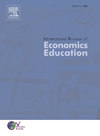Students’ perception of the pluralism debate in economics: Evidence from a quantitative survey among German universities
来源期刊:International Review of Economics EducationDOI:10.1016/J.IREE.2018.07.003
Improving financial literacy of the poor and vulnerable in Indonesia: An empirical analysis
来源期刊:International Review of Economics EducationDOI:10.1016/J.IREE.2019.100168
The effects of using Facebook as a discussion forum in an online principles of economics course: Results of a randomized controlled trial
来源期刊:International Review of Economics EducationDOI:10.1016/J.IREE.2019.100157
Quantile regression analysis of cooperative learning effects
来源期刊:International Review of Economics EducationDOI:10.1016/J.IREE.2018.04.001
Why does peer instruction improve student satisfaction more than student performance? A randomized experiment
来源期刊:International Review of Economics EducationDOI:10.1016/J.IREE.2018.10.001
The relationship between migration background and knowledge and understanding of personal finance of young adults in Germany
来源期刊:International Review of Economics EducationDOI:10.1016/J.IREE.2018.06.003
Identifying differential benefits from a flipped-group pedagogy in introductory microeconomics
来源期刊:International Review of Economics EducationDOI:10.1016/J.IREE.2018.07.002
Experiential learning in macroeconomics through FREDcast
来源期刊:International Review of Economics EducationDOI:10.1016/J.IREE.2018.05.004
Recounting the role of emotions in learning economics: Using the Threshold Concepts Framework to explore affective dimensions of students’ learning
来源期刊:International Review of Economics EducationDOI:10.1016/J.IREE.2018.08.001
Teaching macroeconomics with data: Materials for enhancing students’ quantitative skills
来源期刊:International Review of Economics EducationDOI:10.1016/J.IREE.2018.11.001
Flipping the classroom and student learning outcomes: Evidence from an international economics course
来源期刊:International Review of Economics EducationDOI:10.1016/J.IREE.2019.100163
The construction of frameworks in learners’ thinking: Conceptual change and threshold concepts in economics
来源期刊:International Review of Economics EducationDOI:10.1016/J.IREE.2018.05.002
Collaborative learning in economics: Do group characteristics matter?
来源期刊:International Review of Economics EducationDOI:10.1016/J.IREE.2019.100159
Do crib sheets improve student performance on tests? Evidence from principles of economics
来源期刊:International Review of Economics EducationDOI:10.1016/J.IREE.2018.08.003
Assessment of economic threshold concepts in higher education
来源期刊:International Review of Economics EducationDOI:10.1016/J.IREE.2018.11.002
Active financial analysis: Stimulating engagement using Bloomberg for introductory finance students
来源期刊:International Review of Economics EducationDOI:10.1016/J.IREE.2018.12.001
Using ‘happy’ or ‘sad’ face in a decision-making grid to motivate students to improve academic success
来源期刊:International Review of Economics EducationDOI:10.1016/J.IREE.2018.03.006
Student Academic Performance and Professional Training Year
来源期刊:International Review of Economics EducationDOI:10.1016/J.IREE.2018.03.004
Can homo economicus be an altruist? A classroom experimental method
来源期刊:International Review of Economics EducationDOI:10.1016/J.IREE.2019.100167
Pedagogical pluralism in undergraduate urban economics education
来源期刊:International Review of Economics EducationDOI:10.1016/J.IREE.2019.100158
Microeconomic education, strategic incentives, and gender: An oligopoly classroom experiment with social interaction
来源期刊:International Review of Economics EducationDOI:10.1016/J.IREE.2018.09.001
Models of strategic interaction in quantities vs. prices with differentiated goods
来源期刊:International Review of Economics EducationDOI:10.1016/J.IREE.2018.08.002
Teaching hypothesis testing with simulated distributions
来源期刊:International Review of Economics EducationDOI:10.1016/J.IREE.2018.05.005
Faculty’s conceptions of teaching introductory economics in higher education: A phenomenographic study in a South African context
来源期刊:International Review of Economics EducationDOI:10.1016/J.IREE.2018.05.001
IQA: Qualitative research to discover how and why students learn from economic games
来源期刊:International Review of Economics EducationDOI:10.1016/J.IREE.2019.100160
Using data and research to address student misconceptions
来源期刊:International Review of Economics EducationDOI:10.1016/J.IREE.2019.100156
Interest as an influencing factor on student achievement in Economics
来源期刊:International Review of Economics EducationDOI:10.1016/J.IREE.2018.03.005
Poetry and economics: Creativity, engagement and learning in the economics classroom
来源期刊:International Review of Economics EducationDOI:10.1016/J.IREE.2019.100155
I’ll share with her, but not with you: A mixed methods approach to investigating children’s naïve theories about resource allocation decisions
来源期刊:International Review of Economics EducationDOI:10.1016/J.IREE.2019.100162
A two-round in-class trading game on the principle of comparative advantage and the theory of reciprocal demand
来源期刊:International Review of Economics EducationDOI:10.1016/J.IREE.2018.10.002
Is assessing learning outcomes a trade-off in experiential learning? Integrating field visit with managerial economics course
来源期刊:International Review of Economics EducationDOI:10.1016/J.IREE.2019.100169
The value in ‘value’: An exercise for pluralising economics instruction
来源期刊:International Review of Economics EducationDOI:10.1016/J.IREE.2018.07.001




